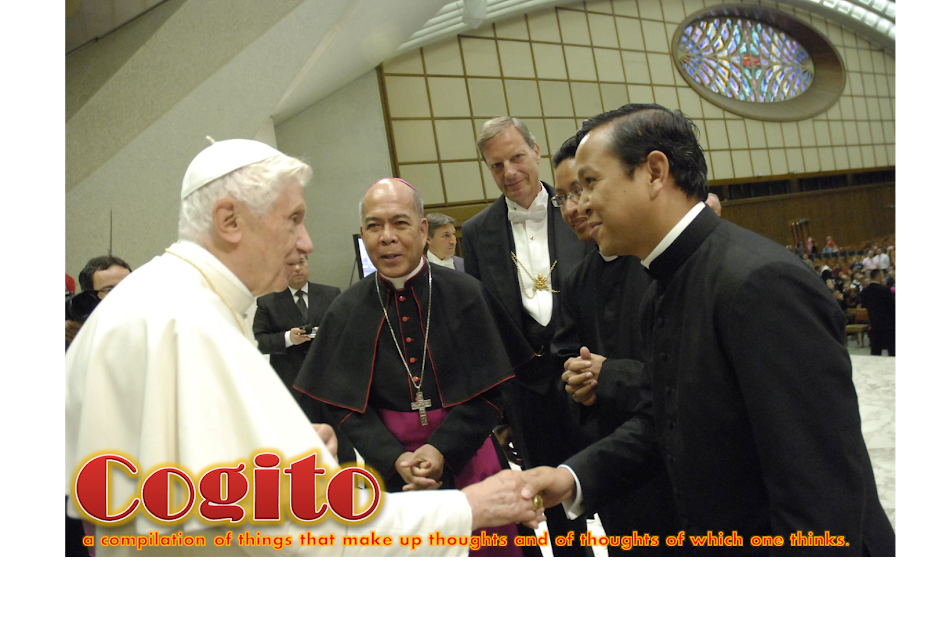HOMILY
33rd Sunday
in O. T.
I’m
sure you are familiar with that advertisement which says: “Happy lang, walang ending”. Of course, you would think, that
statement is nothing more than just a cliché. And you may be right! But I guess
this statement also embodies one of our greatest longings: the longing for
eternity, for a life of happiness without end.
Nothing
is wrong with this longing for eternity. It is perfectly natural. It simply
shows what we are made for. As St. Augustine puts it: “You have made us, O Lord, for Yourself; and our heart is restless
until it rests in You”. In God, lahat
happy lang, walang ending!
On
this second to the last Sunday in Ordinary Time, our liturgy gives us a glimpse
of the possibility of attaining eternal life without end. Endless happiness
with God is possible. However, as our readings reveal to us today, eternal
happiness requires, first of all, the end of everything that is temporal and
worldly. Time has to end first, then, comes eternity.
In
the First Reading, the prophet Daniel describes the time of the end. He said: “there
will be a time of distress such as never occurred since there was a nation
until that time; … Many of those who sleep in the dust of the ground will
awake, these to everlasting life, but the others to disgrace and everlasting contempt.”
A
similar scene we can find in the words of our Lord in the Gospel: “In those
days, after that tribulation, the sun will be darkened and the moon will not
give its light, and the stars will be falling from heaven, and the powers that
are in the heavens will be shaken.” It is a very frightening sight to behold!
However,
the Lord also added that people “will see the Son of Man coming in clouds with
great power and glory. And then He will send forth the angels, and will gather
together His elect from the four winds, from the farthest end of the earth to
the farthest end of heaven.”
The
end of time is inevitable. We know by experience that everything in this world
has an end. Perhaps, this is the reason why many people today do not believe
anymore in “forever”. Wala raw “forever”
dahil lahat may “ending”.
The
end of time has to occur in order for eternity, the “forever”, to take place.
This is also a great lesson of life: if you want a new beginning, there has to
be an end to the old ways of life. Oftentimes, the end is frightening. But the
more horrifying is the end, the sweeter and more exciting is the new beginning!
Never
fear the end of time. Instead, hope for eternity. When Jesus gives His
disciples a glimpse of the end of the world, it was not to frighten them; it
was rather to inspire them – and us today – to aspire for a world that does not
end. Whenever we are reminded that everything in this world ends, it is to
inspire us to look for things that endure.
Do
not allow yourselves to be caught up by passing possessions, by fleeting
pleasures and by treasures that corrode. Rather, aspire more for things that
are heavenly, for enduring possessions, for incorruptible treasures. Now you
know that the world will soon end, begin to long for heaven.
But
Jesus also said: “But of that day or hour no one knows, not even the angels in
heaven, nor the Son, but the Father alone.” Perhaps, the reason why God did not
reveal the exact date of the end of time is to keep us always excited and
yearning for heaven. It does not matter
when; what matters is that heaven awaits us. Hence, let us fix our attention to
that truth.
The
Second Reading tells us that, even though the end of the world will surely
come, we must always fix our eyes on Jesus, Who is now “seated at the right
hand of God, waiting from that time onward until His enemies be made a
footstool for His feet.” Hence, do not pay attention to that horrifying scene
of “darkened sun and moon” and of
“falling stars”. Rather, fix your gaze on “the Son of Man coming in clouds with
great power and glory.” Do not focus more on the fact that the world will
surely end; rather, fix your eyes on the truth that Jesus will surely come!
Brothers
and sisters, in a personal way, what our Lord is saying to each of us is this:
whenever everything seems to end for you, never mind the ending, just focus
your attention on Jesus. He is telling you and me: “when you see these things
happening,” -- when life and your world seem to end – “recognize that He is
near, right at your door.”
If
Jesus is truly with you, dapat happy
lang, walang ending!




